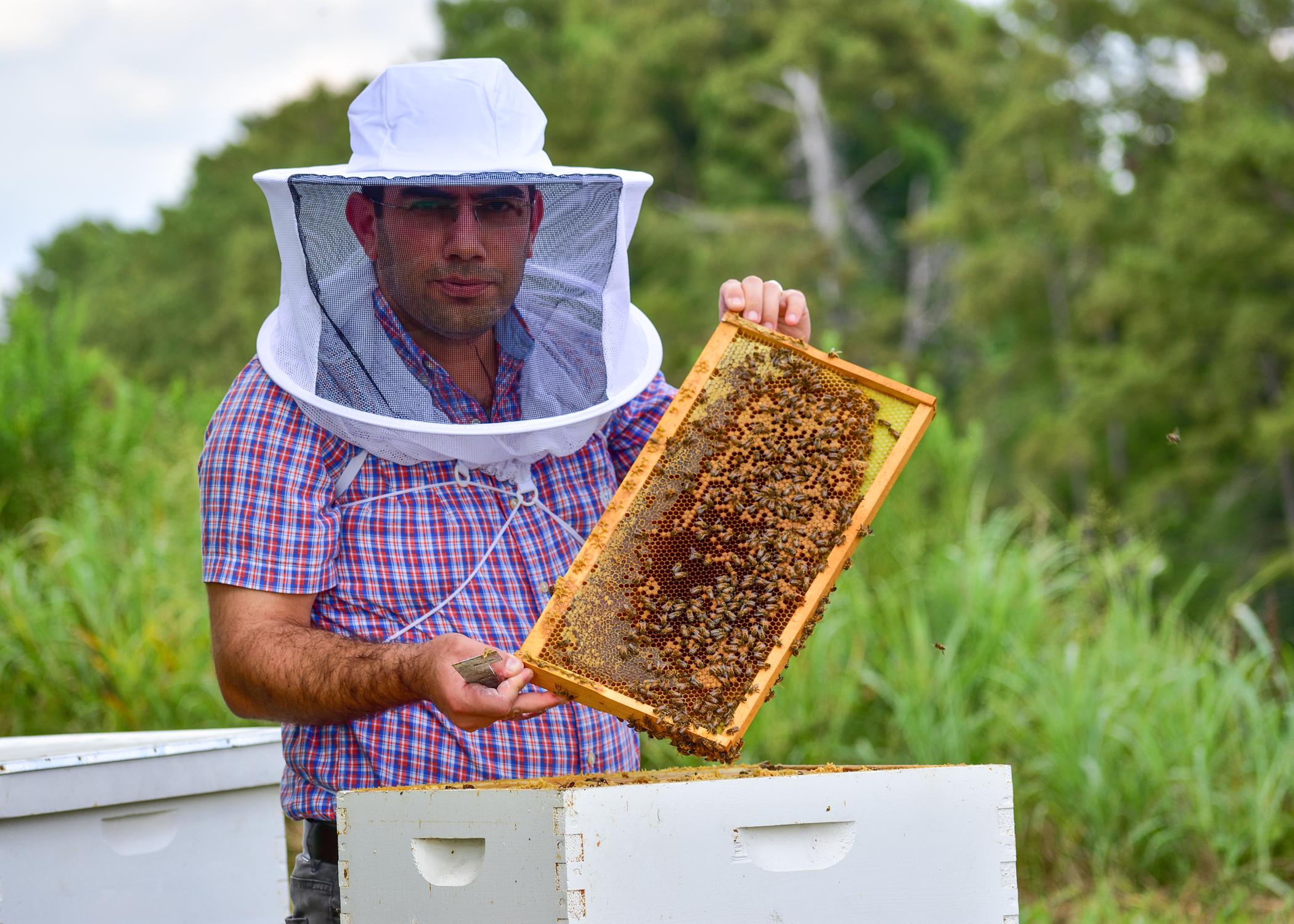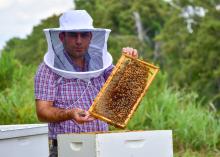Information Possibly Outdated
The information presented on this page was originally released on August 22, 2022. It may not be outdated, but please search our site for more current information. If you plan to quote or reference this information in a publication, please check with the Extension specialist or author before proceeding.
Delta-based apiculture study uses weather center data
STONEVILLE, Miss. -- Delta Agricultural Weather Center stations typically record historical weather data and help growers make production decisions, but now they are also key components of a new honeybee study at Mississippi State University.
Esmaeil Amiri, an assistant professor of apiculture with the MSU Extension Service and researcher with the Mississippi Agricultural and Forestry Experiment Station, is using the facilities and datasets provided by the weather center for his research team’s study on the effect of weather on honeybee health.
The center, which features 37 fixed weather stations and various mobile stations for crop variety trials, is located at the MSU Delta Research and Extension Center in Stoneville.
“Honeybee activities highly depend on climate conditions. Rainfall, low temperature and high winds are all known to restrict honeybee foraging activities,” Amiri said. “In recent years, poor weather in spring and summer, when colonies are highly active, has been a challenge for beekeepers and possibly led to increased pathogens in honeybee colonies and caused colony mortality.
“Identifying the key drivers of honeybee diseases is crucial to preserving honeybee populations,” he said, “and I believe the agricultural weather data can answer a piece of the puzzle about honeybee colony mortality.”
Amiri said his team’s long-term goal is to use the data from the Delta Agricultural Weather Center to find out how long- and short-term climate change can impact honeybee health in respect to pests and pathogens.
“We also have a plan to place honeybee colonies close to several weather stations and study the effect of microclimate on the prevalence of environmental stressors on the health and fitness of the colonies,” he said. “At first, the research team plans to study weather’s effects on populations of small hive beetles in research colonies across the Mississippi Delta.”
The small hive beetle is an invasive insect that originated in sub-Saharan Africa and became established in the U.S. in 1996. This insect causes considerable damage to the honeybee colonies and apicultural industry in the South.
“The small hive beetle has the potential to expand its habitat to the other parts of the country due to the recent global warming,” Amiri said. “It is crucial to perform interdisciplinary research to understand the effect of weather and climate warming on the prevalence and expansion of the pest and pathogens in honeybee colonies.”
The automated weather stations at the Delta Agricultural Weather Center measure precipitation, temperature, relative humidity, solar radiation, soil temperature at various depths, and wind speed and direction. Real-time weather data is updated every 15 minutes. All other parameters can be found on an hourly and daily basis. All weather data is archived and available at the weather center’s website, http://deltaweather.extension.msstate.edu/.
“The center offers a variety of data and tools on its website for growers and researchers,” said Marcus Silva, weather center program coordinator. “The site includes current daily weather information in real time; historical weather information; planting date information for cotton, corn, rice and soybeans; and pond temperature predictions, as well as other tools.”
Amiri, who joined MSU earlier this year, said the Mississippi Delta is an ideal place for his research activities.
“The Delta is an intensive agricultural area, and a favorite place for beekeepers to move and locate their colonies in the Delta for honey production. While collecting nectar from different crops, honeybees play an important role to pollinate our crops. However, in such an intensive agricultural area, honeybees are exposed to different environmental stresses including pesticides, pathogens and climate change,” he said.
The Delta R&E Center supports the weather center through a cooperative agreement with the USDA Agricultural Research Service. The center is also supported by Cotton Inc., the Mississippi Corn Promotion Board, the Mississippi Rice Promotion Board and the Mississippi Soybean Promotion Board. Grant funding for Amiri’s program helps fund the stations for his study.






